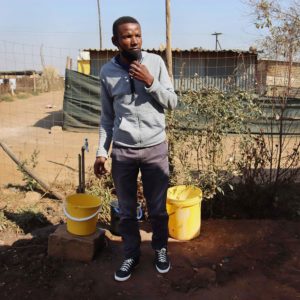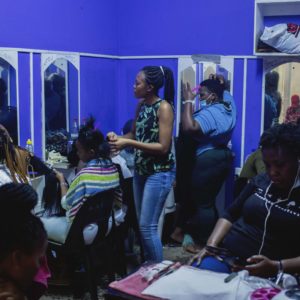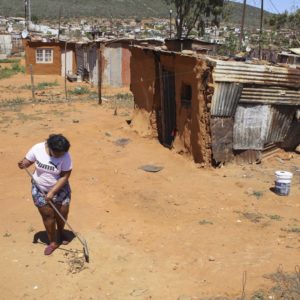Nigel occupiers feel deserted by politicians
Few things have changed for a community in Ekurhuleni who occupied homes almost two years ago, and the residents feel neglected by councillors in the run-up to elections.
Author:
29 October 2021
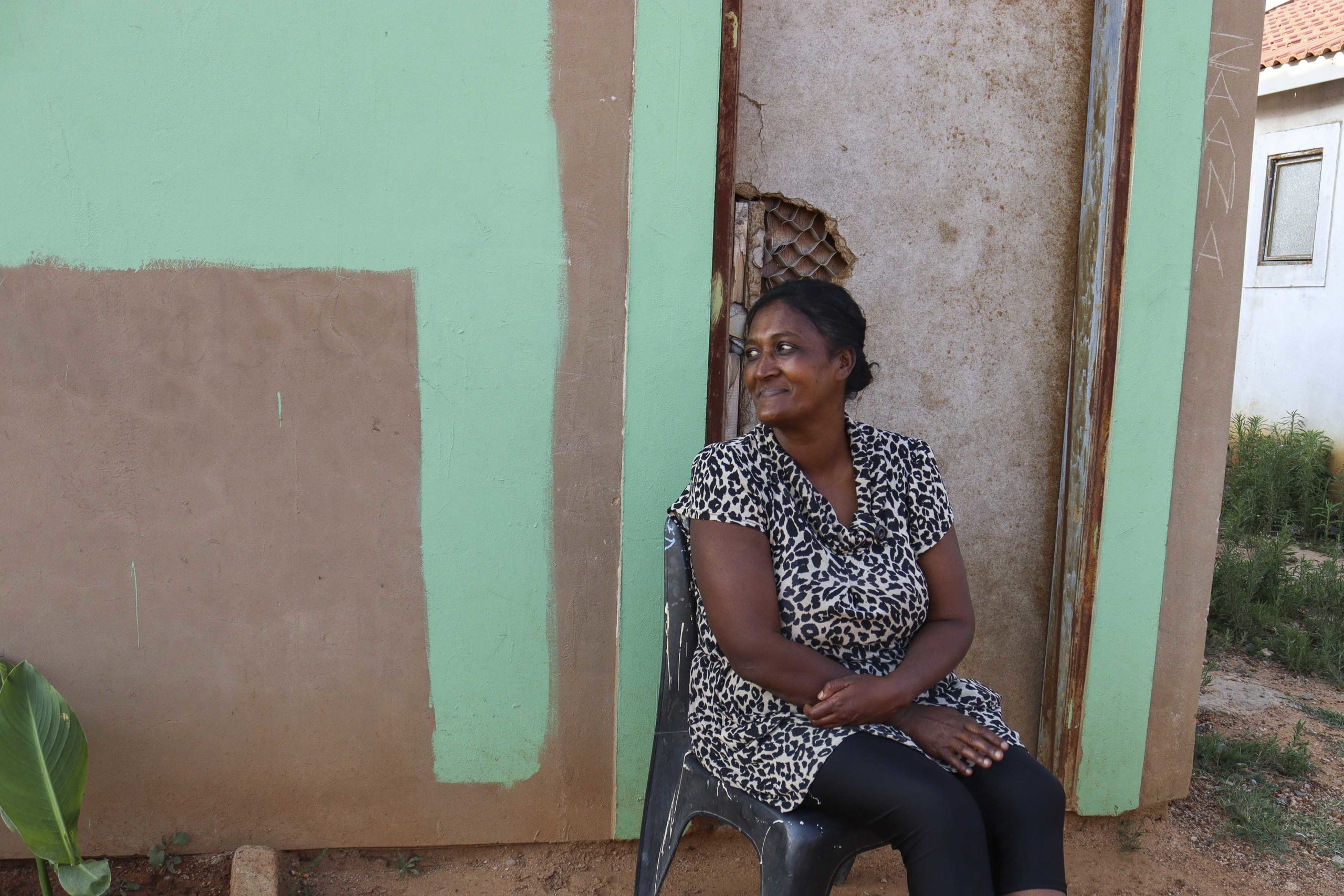
Jerome van Greenen, 50, a member of the Gauteng Housing Crisis Committee, which fights for land, decent housing and jobs, says despite attempts to set up interviews with political parties to find out what they can do for the community, residents have been snubbed.
“I feel like they are running for elections, they want to be councillors. If they want to be councillors, they must come down and see what are the needs of our people,” he says. “My vote is actually the key to any party councillor candidate who wants to stand office – not only me, but the community as a whole. So if they can’t come out to hear what we want to ask them, they have failed us already and they are not yet in office.”
Van Greenen, who is married with four children, grew up in Reiger Park in Boksburg, but has been working with Alra Park residents since 2014 when there were only streets and no houses in Mackenzieville Extension 2. He applied for housing in 2003, but says he does not appear on the national database.
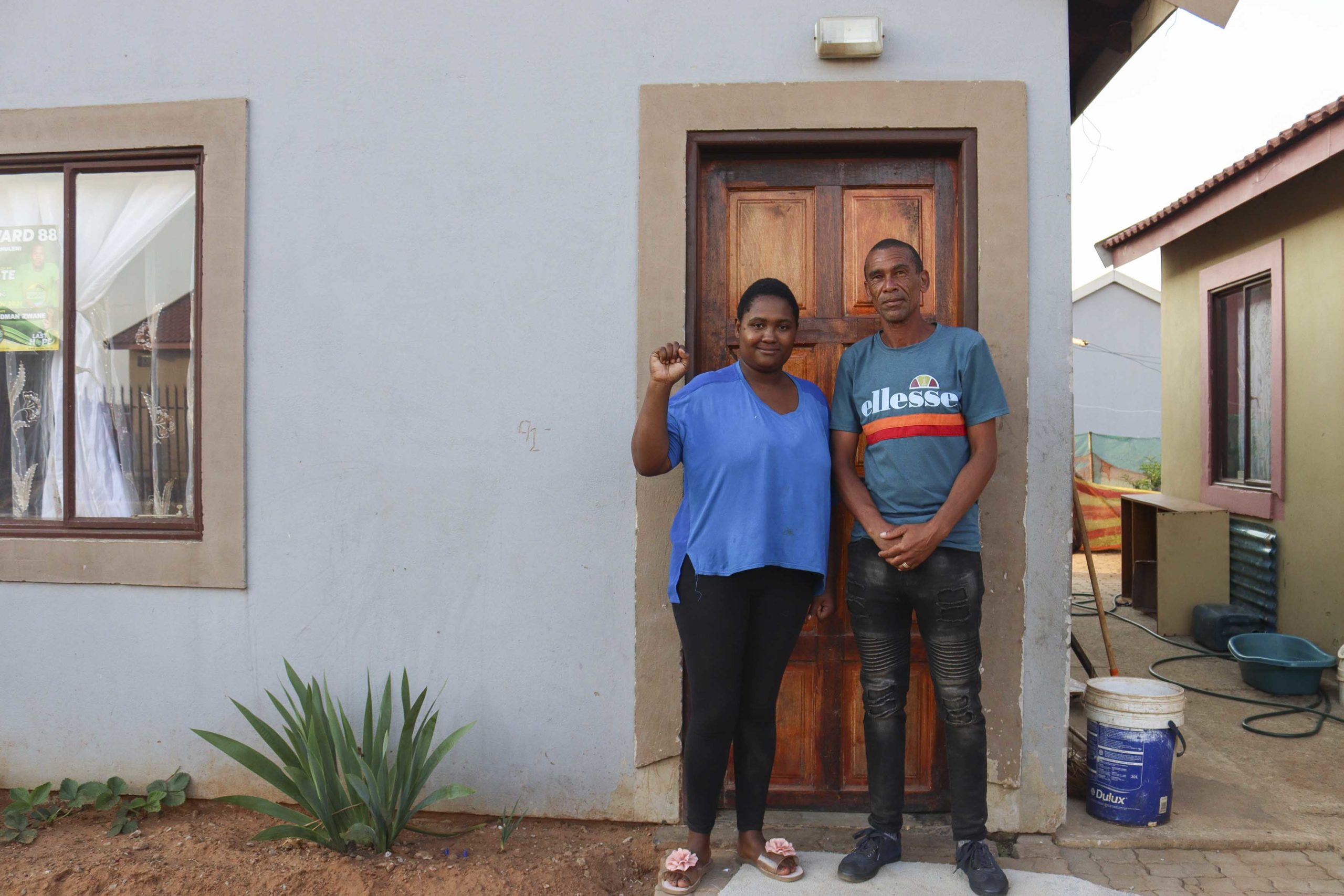
In December 2019, Alra Park backyard dwellers occupied newly built homes in Mackenzieville Extension 2 that had been earmarked for Snake Park shack settlement dwellers and former struggle veterans. Van Greenen says the police broke down doors to try to force them out without a court order, but did not succeed. Ironically, a few months after they occupied the houses, Snake Park was electrified.
All of the 600 RDP houses are occupied by close to 1 200 residents, many of them families. Of those houses, 280 were complete while the remaining 320 had to be finished by the residents.
Although there are electricity poles and boxes, there is no electricity or working street lights in the area, and sewage trickles out in places. The occupiers use paraffin or gas stoves to cook. The façade of each house has a name painted on it to claim ownership.
Making their mark
Farzaana Mangera, 44, moved from Alra Park when she heard houses had been left vacant and vandalised for more than three years. “There’s a roof here, and we [didn’t] have houses so we came here to look after these houses. We fixed them, we put windows in, we put doors in, and now at least we have a roof over our heads. But unfortunately we are still fighting for these houses in court,” she says.
The residents say they want title deeds to the homes, but their case has been postponed to next year.
Mangera lives with her 16-year-old daughter. Her older children have moved out. She says most people will vote for the Patriotic Alliance because the councillor candidate for ward 88 engages with residents and lives with them, so he knows their struggle.
“I can’t wait for the 1st of November. We would like to see new changes, obviously. We are no longer going to vote for the old cats. We saw mos [after all] what they did to us. Most parties want our votes before they can do anything for us … it works like that,” she says.
Related article:
Natasha Brimmer, 49, also moved from Alra Park. She worked at a casino, but has been out of a job since 2012 when an operation on her spine left her disabled. “I’ve been a backroom dweller since I’ve known myself, and I’m disabled. I couldn’t afford rent because that little bit of money that you get, that R1 800, must pay my rent, and I must buy food, so how must I survive? That’s why I’m living here today,” she says.
Brimmer uses most of her disability grant money to pay back the spaza shop, neighbours and friends. She votes because she wants to make her mark as a South African. This time, she wants to vote for a younger candidate because they have grown up in these conditions and might make a difference – unlike the older candidates.
“‘Elections’ is a big word for me because we have been voting for how many years, what have [older candidates] done for me? I’m still where I am … I’ve been voting all my life. I go to the hall, I make my mark because I think, ‘Okay, this party will do it for me’, but [they’re] shameless, they don’t even care after that. They [are] no more worried about you. They no more come out like before. They’re nice with you now, but when they [are] in those big cars, they don’t worry about you, so you just have to live your life like this. It’s frustrating. You can see I’m frustrated because I live like this every day,” she says.
A tough life
Brimmer is a security guard, social worker, therapist and police officer – at least that’s how the community treats her, often coming to her for help. Limping to her home after remarking that the media takes pictures of her but makes no difference to her life, she points out her living conditions. She lives in a basic, scantily furnished home with no ceiling, electricity, toilet or water.
“I’m disabled [and] I have to take my bucket out every day to drain it. It’s also taking away your pride, you understand? You use a bucket all the time [to relieve yourself]. But I say as long as I have a roof over my head, I’m not worried about a toilet at the moment, but sanitation and running water is very important. So we have to fetch water outside, and you know when you’re disabled it’s a struggle,” she says.
“People don’t want to employ you when you’re disabled. They discriminate against you. I have thrown in my CVs here and there because I’m very educated. I’m not stupid. So, when they see me walking like this, they tell me, ‘Okay, we’ll let you know’, but it’s in vain. They don’t let me know.”
Related article:
Brimmer lives with her 20-year-old daughter, who is a drug user and also unemployed. “Nobody can help her … Now because she is lonely and she can’t find a job, she is reaching out for drugs to smoke. Is that now right, ma’am? Our children are getting lost out there because of this situation.
“Sometimes I don’t even have anything to eat, but we have good neighbours here.” Her voice starts to break. “I don’t even want to start crying. I’ve got no more tears left. I [have lived] on the street with my child … for four years … sleeping on the streets in the cold. People don’t know where I come from, and that’s why I appreciate having a roof over my head.”
‘All of us need homes’
Gloria Julie, 20, lost her parents when she was five years old. She was homeless for a number of years before becoming a backyard dweller, and eventually occupied one of the homes in 2019. She will be voting for the first time.
“I won’t say I am excited because when I look around, nothing has been done,” she says. “I haven’t seen a difference. People are still living the same because of the unemployment rate, some struggle even to buy a candle. It’s so hard. The condition here is so, so hard, but we are living.”
Julie lives with her boyfriend who has an on-and-off job, and her son, whose R450 child grant helps her provide what she can. The R350 social relief of distress grant, which she recently collected, has also given them a boost. “That grant, it helps, yoh, it helps a lot. That money is little but at least it patches. It goes a long way,” she says.
Related article:
Current DA ward councillor Wollaston Labuschagne is running for re-election but apparently avoids the community. “When the pandemic hit, he bought food but turned [around] at a nearby school and said, ‘They cannot get food because they have invaded the place.’ He has deprived us of a lot of things. Every time when we ask him for a meeting, he always has stories,” Van Greenen claims.
Julie feels bad for occupying a home that was not meant for her, but says she had no choice. “All of us here are going through a tough time. No one here can say I’m better than the other. If the one says, ‘You’re poor’, you can say, ‘You too’, because we are living in the same condition and most of us are unemployed.
“All of us need homes, but I would prefer for the government to serve us all because we are all in the same situation. Yes, [Snake Park shack dwellers] are in mazenke [corrugated iron], but at least they have a house. We [didn’t] have a home … Some of the mkukus [shacks] are leaking, busy breaking, so it will only be fair if the government can build more houses, because that’s what we need,” Julie says.

